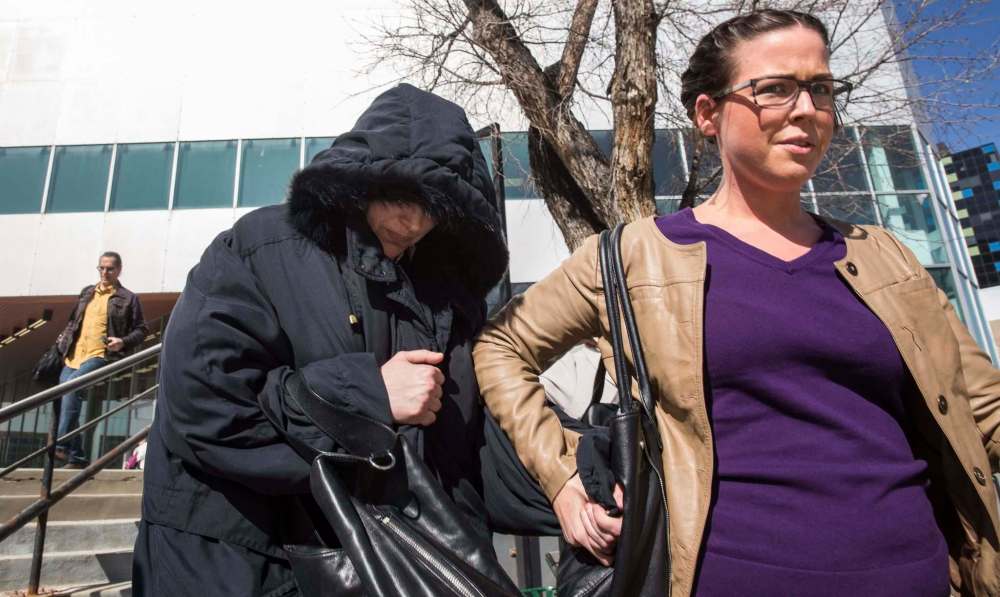Defence tries to have charges tossed in dead babies case
Advertisement
Read this article for free:
or
Already have an account? Log in here »
To continue reading, please subscribe:
Monthly Digital Subscription
$0 for the first 4 weeks*
- Enjoy unlimited reading on winnipegfreepress.com
- Read the E-Edition, our digital replica newspaper
- Access News Break, our award-winning app
- Play interactive puzzles
*No charge for 4 weeks then price increases to the regular rate of $19.00 plus GST every four weeks. Offer available to new and qualified returning subscribers only. Cancel any time.
Monthly Digital Subscription
$4.75/week*
- Enjoy unlimited reading on winnipegfreepress.com
- Read the E-Edition, our digital replica newspaper
- Access News Break, our award-winning app
- Play interactive puzzles
*Billed as $19 plus GST every four weeks. Cancel any time.
To continue reading, please subscribe:
Add Free Press access to your Brandon Sun subscription for only an additional
$1 for the first 4 weeks*
*Your next subscription payment will increase by $1.00 and you will be charged $16.99 plus GST for four weeks. After four weeks, your payment will increase to $23.99 plus GST every four weeks.
Read unlimited articles for free today:
or
Already have an account? Log in here »
Hey there, time traveller!
This article was published 14/07/2017 (3075 days ago), so information in it may no longer be current.
A Manitoba judge has dismissed a last-minute request to have an unprecedented case tossed out of court because of delay.
Two hours before a Winnipeg mother was set to be sentenced for hiding the remains of dead babies in a storage unit, the trial judge was considering the defence team’s request to drop the case because of unreasonable delay.
Andrea Giesbrecht, 43, has been convicted on six counts of concealing a child’s body after U-Haul staff discovered decayed and mummified human remains in October 2014. The Crown is seeking an 11-year sentence; the defence argued Giesbrecht, who was behind bars 168 days before being granted bail, should not spend any more time in jail.
Provincial court Judge Murray Thompson sentenced Giesbrecht Friday afternoon, a date arranged three months ago. But he first had to decide whether the case should be tossed out altogether because of delays in getting it to court. Ultimately, the judge agreed with the Crown that the defence request should be dismissed.
“Raising the spectre of a motion for unreasonable delay… (at the sentencing hearing), when a conviction was entered months ago, sentencing dates have been set for months, and distracting a judge writing an important and detailed decision is unacceptable,” Thompson said in his decision.
“Public confidence in the justice system is enhanced when important legal issues are decided in a timely way and in accordance with rules set out by the law. Ironically, this is a motion for delay that has been delayed and asks for further delay,” he said.
The defence filed the motion arguing that her Charter rights have been violated because of unreasonable delay at 4:30 p.m. July 11. Manitoba courts’ rules for lawyers require constitutional challenges to be filed with at least 30 days notice.
But lawyer Greg Brodsky argued Giesbrecht’s Charter rights “should not take a backseat” to the timelines for filing legal motions.
Brodsky told Thompson Friday morning his client is “nervous” about spending time away from her two children.
“She wants every argument that’s available to her to be made to the court,” he said.

The judge questioned why the motion was filed at the last minute, and Brodsky said it was because he needed to see recent court decisions, referencing the Supreme Court’s Cody decision, which was released June 16, as well as a June 29 Manitoba Court of Appeal decision in the Schenkels case.
Neither decision changed the law regarding unreasonable court delays. Both uphold the Supreme Court’s July 2016 Jordan decision, which directed provincial court trials to be completed within 18 months from the date charges are laid. Superior court trials — Court of Queen’s Bench in Manitoba — must be completed within 30 months, the high court ruled.
In Schenkels’ case, the Appeal Court said defence delay motions should be filed by the time trial dates are set, rather than at the last minute.
Giesbrecht was charged in October 2014 and the trial stretched on until Oct. 5, 2016, even though the defence decided to skip a preliminary inquiry in the case. The defence argues there’s been a delay of more than 30 months. The Crown says the time from arrest to trial amounts to 23 1/2 months and argues the actual delay in the case is only two months past the Supreme Court’s deadline, which wasn’t imposed until the case was already before the court.
The Crown has asked Thompson to dismiss the defence request, particularly without a reasonable explanation as to why it was made so late. It’s not in the best interest of the justice system to allow this case to be tossed out due to unreasonable delay, the Crown argued.

Brodsky said if the Crown needs more time to consider his request, he’d be happy to accommodate, suggesting the judge put the sentencing decision on hold.
“I don’t want to spring something” on the Crown, he said.
“It seems like that’s exactly what’s happening,” Thompson replied, noting Brodsky’s objection to delay in the case flies in the face of his willingness to further delay the matter.
The case has been described as the worst case of concealing infants’ remains in Canadian law because of the number of fetuses involved. The decomposed bodies of five boys and one girl were discovered within plastic totes and pails in the McPhillips Street storage unit after Giesbrecht failed to pay her rental fee. Some were encased in a concrete-like substance, bagged up and stored along with miscellaneous items, including children’s toys.
All of the fetuses were found to be between 34 and 42 weeks gestation. The remains were too badly decomposed for investigators to figure out how they died, but medical experts testified during the trial that they were likely born alive. The chance of all six babies being stillborn was one in 500 trillion, court was told.
katie.may@freepress.mb.ca
Twitter: @thatkatiemay

Katie May is a general-assignment reporter for the Free Press.
Our newsroom depends on a growing audience of readers to power our journalism. If you are not a paid reader, please consider becoming a subscriber.
Our newsroom depends on its audience of readers to power our journalism. Thank you for your support.
History
Updated on Friday, July 14, 2017 1:52 PM CDT: Adds sentence.
Updated on Friday, July 14, 2017 7:26 PM CDT: Final version


